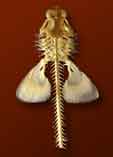
|
|
|
|
|
|
Shark Info (09-15-2000) |
Author |
|
Intro: |
Shark Info |
|
Main article: |
Whale Sharks: Central Theme of the AES Conference in La Paz, Mexico |
Shark Info |
Article 1: |
Shark Info |
|
Article 2: |
Dr. A. J. Godknecht |
|
Article 3: |
Dr. E. K. Ritter |
|
Fact Sheet: |
Dr. E. K. Ritter |
|
The cruel business with shark cartilage and cancerShark cartilage pulverized or in pill form is marketed as a "noble fitness maker" for stressed contemporaries. Sold mainly as a food additive, shark cartilage has also, however, frequently been ascribed to preventing cancer. The products thus fill cash registers at the cost of sharks and are aimed not only at health fanatics, but also at millions of desperate cancer patients. However, most companies are clever enough not to push their products as cancer remedies, for that would be illegal. The fact is that up until today shark cartilage has not been recognized as an official remedy by any licensing authority. The effect of cartilage preparations against cancer and other inflammatory illnesses is thus appropriately "only" covered up as a pleasant side effect, but potential customers are quickly made aware of this through the citing of extremely questionable medical journals. How everything began
"Sharks don't get cancer", or in the German version, "Why are sharks immune against cancer", was the title of a book written by Dr. William I. Lane, which in the first half of the 90s initiated the "run" on shark cartilage. It was based on scientific research carried out in 1983 at the Massachusetts Institute of Technology (MIT) which determined that cartilage from calves and sharks influenced the blood supply and thus indirectly the growth of tumors. The book cited questionable studies on shark cartilage as a cure-all against cancer. This was a clever move, considering that the intelligent and efficient agro-biochemist, William Lane, is also President of the American Fish Meal Trade Association by trade and had previously researched investment possibilities in the Guinean fishing industry for the former Reagan Administration. An effective cancer cure promised to turn into a billion dollar business, for Lane as well, as the owner of one of the largest companies dealing with shark products. Facts
A pioneer process in the U.S.June 30, 2000, marks the first notable conviction of producers of shark cartilage preparation. The American Federal Trade Commission (FTC) ordered Lane Labs-USA Inc. and Cartilage Consultants to immediately stop their marketing of shark cartilage as a remedy against cancer. Andrew Lane, President of Lane Labs and his father, the already known Dr. William I. Lane, owner of Cartilage Consultants, were accused of making common cause under false pretences with the marketing of the shark cartilage preparation "BeneFin" and the sun cream "SkinAnswer". Lane Labs was also convicted of unfair competition and received a fine amounting to an additional one million US dollars. The case had already dragged on for months. On December 10,
1999, the Food and Drug Administration (FDA), those American authorities who among
other things control all medical preparations in the U.S., went to court because of
"Benefin" and "SkinAnswer". The case was subsequently taken
over by the FTC. Since
then the companies have unsuccessfully tried to win congressional delegates for their
cause, always arguing that they had been wrongly accused and that the American
Government was simply trying to prevent citizens from buying "safe and remedial food
additives". Normally the FTC does not intervene so radically in cases of unfair competition. In this instance, according to Daren Bowie of the FTC, the Commission ordered a severe fine because the companies misused the fears of an especially sensitive population segment for their own benefit. Europe is challengedIn Europe similar decisions are stilll pending. Perhaps it is more difficult here than in the U.S. to prove marketing under false pretences. Formulations such as "a series of investigations in various scientific centers in the U.S and Europe have shown that tropical shark cartilage can be a strong opponent against cancer" are legal since they are not directly wrong, but they do persuade customers to believe false facts in direct connection with shark cartilage pills. In Switzerland, shark cartilage preparations are sold, e.g. by GLOBAL TRADING S.a.g.l. - Div. PHARMA in Bioggio (Ti) under the name "Same" (http://www.same.ch). * Dr. Alexander Godknecht is a biologist and president of the Shark Foundation/Hai-Stiftung and member of the Shark Info editorial team. He works at the Center for Computing Services at Zurich University. May be published only by indicating the source: Shark Info / Dr. A. J. Godknecht |
|
|
|
|
|
|||||
